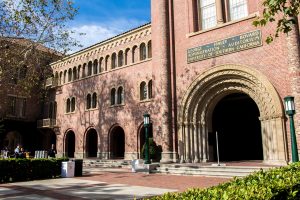Hapa Japanese Festival celebrates multicultural identities
From Feb. 22 to 26, the USC Shinso Ito Center for Japanese Religions and Culture will host the third Hapa Japanese Festival. Hapa refers to a person who is partially Asian or Pacific Islander and the event focuses on celebrating the mixed roots and mixed cultures of Japanese people.
“Roughly 40 percent of the community is mixed race and by the time of the next Census in 2020, Japanese Americans will be the first Asian American group to be majority multiracial,” said associate professor Duncan Williams, the director of CJRC and the founder of the Hapa Japan Project.
The first Hapa Japanese Festival first took place in San Francisco in 2001 and attracted about 1,000 people. By the second one in 2004, the number of participants quadrupled. This is be the first time that USC will host this event.
“The goal of the festival is to showcase through music, food, film and academic presentations the contributions of mixed-race Japanese people,” he said.
The festival includes a myriad of cultural activities and is also the site of the three-day Critical Mixed Studies Conference. The conference will include talks from some of the most esteemed Hapa thinkers including Yasuko Takezawa of Kyoto University and Paul Spickard of UC Santa Barbara. Beyond the academic conference, there will be hapa film screenings, panels, jam sessions, interviews and live performances.
The theme of this year’s event is “trans,” which encompases issues regarding transgender, trangressions, transmigrations and the struggles of being transracial. The festival will bring up very important discussions regarding the “mixed face” and different perspectives on beauty, being an Japanese American during World War II, mixed race identities and Hapa queer and transgender art. The festival will start conversations about the many different kinds of Hapa individuals and their histories.
One of the most anticipated events of the festival is a performance by Kina Grannis, a USC alumna and winner of the the Doritos Crash the Super Bowl Contest where she received a contract with Interscope Records. Grannis attended USC from 2003-2007, and though she graduated with a degree in psychology, she recorded her first EP at the Thornton School of Music.
“USC was really where I got to try out what it meant to be an artist for the first time,” she said. “I had started writing music in high school, but my time at USC was when I started playing shows for the first time, delved even deeper into songwriting and my identity of being a songwriter.”
Gannis is also a hapa individual who has embraced her multiculturality.
“I liked that I could identify with multiple cultures. I liked that we took our shoes off at home, ate sushi, used words like ‘ohashi and ‘shoyu’ around the house,” Grannis said. “I also liked knowing that I had ancestors from England and Ireland and France, and ancestors that traveled to America generations and generations ago.”
Grannis mentioned how her rich heritage influenced her music. Her philosophies resound those of the festival — to celebrate one’s history and connect with those who share it.
“[Being hapa] made me feel more connected to everyone, as opposed to feeling like I belonged strictly to one particular group, and I think that’s something that has really influenced my music,” she said. “When I write songs, my goal is to connect to as many people as possible — to make people feel less alone in the experience of being alive and being a human.”
The Hapa Japanese Festival will commence next Wednesday and run until Sunday. Gannis will perform along with Marié Digby, Kris Roch and Andy Suzuki & The Method on Saturday at 7 p.m. at Bovard Auditorium. The festival and concert are free to USC students.


